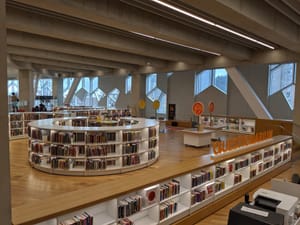I had expected to see more discussion of Stanley Wilder’s article on information literacy in the Chronicle recently. A sample:
Librarians should not assume that college students welcome their help in doing research online. The typical freshman assumes that she is already an expert user of the Internet, and her daily experience leads her to believe that she can get what she wants online without having to undergo a training program. Indeed, if she were to use her library’s Web site, with its dozens of user interfaces, search protocols, and limitations, she might with some justification conclude that it is the library, not her, that needs help understanding the nature of electronic information retrieval. [Subscription service: The Chronicle: 1/7/2005: Information Literacy Makes All the Wrong Assumptions]
Indeed: we have not figured out very good ways of presenting the full range of library resources in the library’s web presence.
Further strong points in a later paragraph:
Information literacy is also harmful because it encourages librarians to teach ways to deal with the complexity of information retrieval, rather than to try to reduce that complexity. That effect is probably not intentional or even conscious, but it is insidious. It is not uncommon for librarians to speak, for example, of the complexity of searching for journal articles as if that were a fact of nature. The only solution, from the information-literacy point of view, is to teach students the names of databases, the subjects and titles they include, and their unique search protocols — although all of those facts change constantly, ensuring that the information soon becomes obsolete, if it is not forgotten first. Almost any student could suggest a better alternative: that the library create systems that eliminate the need for instruction. [Subscription service: The Chronicle: 1/7/2005: Information Literacy Makes All the Wrong Assumptions]
I liked this piece because of its emphasis on the role of the library in understanding and supporting the development of students’ learning and research skills. I also liked the emphasis on making library services easier to use, and placing them in places where users want to see them. That said, the fragmentation of the library data and systems infrastructure does not make this as easy as it should be. Developing an effective web presence is one of the major challenges for libraries in coming years, but this is not straightforward.
Too often, we have an “eat your spinach” message about the library: come to the library, it is good for you. This is apparent in some of the defensive commentary about Google. Libraries have a better story to tell than this …



